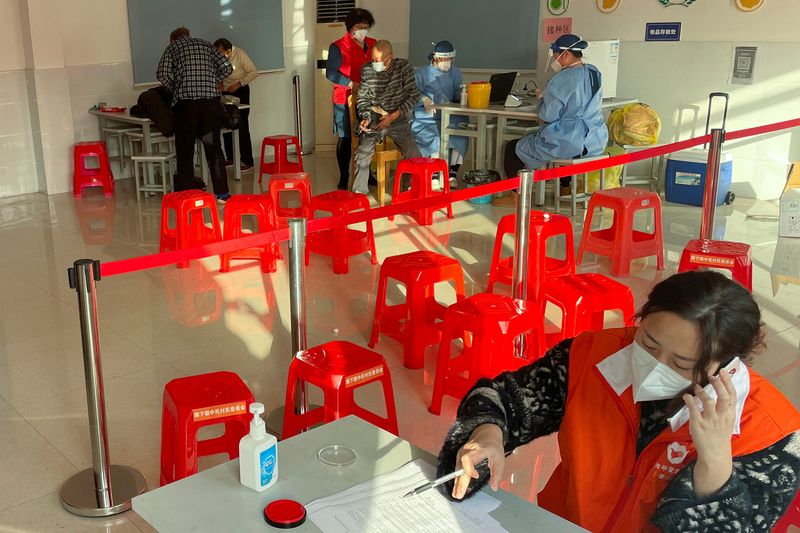
© Reuters. An elderly resident stands from a chair after receiving a dose of a vaccine against coronavirus disease (COVID-19), during a government-organized visit to a vaccination center in Langxia town on the outskirts of Shanghai, China December 21, 2022. REUTERS/
2/3
By Zoey Zhang and Bernard Orr
SHANGHAI/BEIJING (Reuters) -A Shanghai hospital has told its staff to prepare for a “tragic battle” with COVID-19 as it expects half of the city’s 25 million people will get infected by the end of next week, while the virus sweeps through China largely unchecked.
After widespread protests and a relentless rise in cases, China this month took an abrupt shift in policies and began dismantling its “zero-COVID” regime, which has taken a great financial and psychological toll on its 1.4 billion people.
Still, China’s official death count since the pandemic began three years ago stands at 5,241 – a fraction of what most other countries faced.
China reported no new COVID deaths for a second consecutive day for Dec. 21, even as funeral parlour workers say demand has jumped in the past week, pushing fees higher.
Authorities – who have narrowed the criteria for COVID deaths, prompting criticism from many disease experts – confirmed 389,306 cases with symptoms.
Some experts say official figures have become an unreliable guide as less testing is being done across China following the easing of restrictions.
The Shanghai Deji Hospital, posting on its official WeChat account late on Wednesday, estimated there were about 5.43 million positives in the city and that 12.5 million in China’s main commercial hub will get infected by the end of the year.
“This year’s Christmas Eve, New Year’s Day, and the Lunar New Year are destined to be unsafe,” said the private hospital, which employs roughly 400 staff.
“In this tragic battle, the entire Greater Shanghai will fall, and we will infect all the staff of the hospital! We will infect the whole family! Our patients will all be infected! We have no choice, and we cannot escape.”
The post was no longer available on WeChat by Thursday afternoon. A person who answered the hospital’s mainline said they could not immediately comment on the article.
Shanghai residents endured a two-month lockdown which ended on June 1, with many losing income and having poor access to basic necessities. Hundreds died and hundreds of thousands were infected during those two months.
On Thursday, many areas of Shanghai were almost as deserted as back then, with many residents isolating voluntarily and businesses forced to shut as staff fell ill.
“All our employees are sick,” said a supermarket worker surnamed Wang as he was shutting the doors. He “hoped” to re-open on Dec. 30.
Experts say China could face more than a million COVID deaths next year, given relatively low full vaccination rates among its vulnerable elderly population.
China’s vaccination rate is above 90%, but the rate for adults who have received booster shots drops to 57.9%, and to 42.3% for people aged 80 and above, government data shows.
At a hospital in Beijing, footage from state television CCTV showed rows of elderly patients in the intensive care unit breathing through oxygen masks. It was unclear how many had COVID.
The deputy director of the hospital’s emergency department, Han Xue, told CCTV they were receiving 400 patients a day, four times more than usual.
“These patients are all elderly people who have underlying diseases, fever and respiratory infection, and they are in a very serious condition,” Han said.
The head of the World Health Organization said it is concerned about the spike in infections and is supporting the government to focus on vaccinating those at the highest risk.
WHO Director-General Tedros Adhanom Ghebreyesus told reporters the agency needed more detailed information on disease severity, hospital admissions and requirements for intensive care units for a comprehensive assessment.
FREE MEDICINE
China’s policy U-turn caught a fragile health system unprepared, with hospitals scrambling for beds and blood, pharmacies for drugs and authorities racing to build special clinics.
Smaller cities away from the affluent coastal areas are particularly vulnerable. Tongchuan, a city of 700,000 in the northwestern Shaanxi province, called on Wednesday for all medical workers who retired in the past five years to join the battle against COVID.
“Medical institutions at all levels in the city are under great pressure,” it said in a public notice.
State media said local governments were trying to tackle drug shortages, while pharmaceutical companies were working extra-time to boost supplies.
Cities across the country were distributing millions of ibuprofen tablets to medical institutions and retail pharmacies, according to a report in the state-run Global Times.
Germany said it has sent its first batch of BioNTech COVID vaccines to China to be administered initially to German expatriates. Berlin is pushing for other foreign nationals to be allowed to take them.
These would be the first mRNA vaccines, seen as most efficient against the disease, available in China.
China has nine domestically-developed COVID vaccines approved for use.
Some Chinese experts predict the COVID wave will peak in late January, with life likely to return to normal by late February or early March.